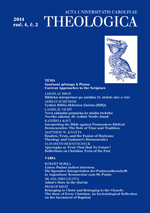Interpreting the Bible against Postmodern Biblical Hermeneutics: The Role of Time and Tradition
Interpreting the Bible against Postmodern Biblical Hermeneutics: The Role of Time and Tradition
Author(s): Kateřina KočíSubject(s): Christian Theology and Religion
Published by: Univerzita Karlova v Praze, Nakladatelství Karolinum
Keywords: Reader-Response Criticism; Reception History; Time; Tradition; Paradigm shift
Summary/Abstract: There are two main streams for interpreting the Bible in postmodern hermeneutics, Reader-Response Criticism and Reception History. They have things in common, namely the “dialogical” character of analysis. However, they differ significantly in their perception of the role of time and tradition. Reader-Response is a purely synchronic approach; it has no interest in either time or tradition in its analysis. Scholars of Reader-Response claim that there is no persistency of meaning throughout time. On the one hand, we see this as a deficiency because it suggests that there is no such a thing as meaning of the text at all. On the other hand, it leaves enough space for original interpretation. Scholars of Reception History insist on the continuity of meaning throughout time. Thus they claim that there really is something which we may call the “core meaning” of the text to which new interpretations add new significances. However, they risk the other extreme – over-reliance on the tradition and dismissal of interpretations which are not in continuity with the tradition. David P. Parris brings in a concept of “paradigm shift”, which takes tradition into account but leaves enough space for the originality of new interpretations.
Journal: Acta Universitatis Carolinae Theologica
- Issue Year: IV/2014
- Issue No: 2
- Page Range: 219-231
- Page Count: 13
- Language: English

